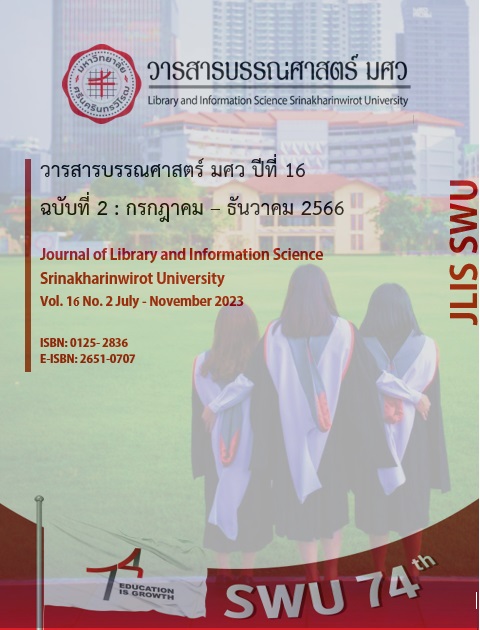STRATEGY FOR ACADEMIC MANAGEMENT BASED ON DESIGND THINKING FOR SUSTAINABLE DEVELOPMENT OF NAKHONRATCHASIMA PRIMARY EDUCATIONAL SERVICE AREA OFFICE 4
Keywords:
Design Thinking, Sustainable Development, Academic ManagementAbstract
The objective of this study was to propose strategies for academic management based on the design thinking process for sustainable development. It employed a quantitative research approach and included a sample of 124 schools under the Nakhonratchasima Primary Educational Service Area Office 4. A total of 496 informants consisted of school directors, deputy directors in academic affair, primary school teachers, and secondary school teachers. There were altogether 412 questionnaire respondents or 83.06%. Data analysis involved descriptive statistics including frequency, percentage, mean, and standard deviation; Priority Needs Index (PNImodified); and content analysis.
Investigation suggested a high level of mean ( = 3.831 SD. 0.738) for the current state, and a high level of mean ( = 4.350 SD. 0.839) for the desirable state. The needs were reported for curriculum development; development of educational media, innovations, technologies, and learning sources at a high level, as weaknesses (PNImodified = .147), and the measurement and evaluation at a high level, as weakness (PNImodified = .141). External factors were reported for the state of technologies at a high level, as weakness (PNImodified = .147); and the development of educational media, innovations, technologies, and learning sources at a high level, as weaknesses (PNImodified = .184). Hence, strategies for academic management based on the design thinking process for sustainable development were determined and proposed in 3 main strategies as follows. 1) Developing school curriculum focusing on design thinking process to enhance learner’s skills and abilities; 2) Developing educational media, innovations, technologies, and learning sources focusing on design thinking process to enhance learner’s skills and abilities. 3) Developing a measurement and evaluation process focusing on design thinking process to enhance learner’s skills and abilities.
References
Bennett, A. G., & Cassim, F. (2017). How Design Education Can Use Generative Play to Innovate for Social Change: A Case Study on the Design of South African Children’s Health Education Toolkits. 11(2).
Chamchoy, S. (2012). Concept of Innovation for School Management in the 21st Century. Journal of Education Naresuan University, Faculty of Education, Naresuan University, 14(2), 117-128.
Department of Economic and Social Affairs. (2023). Sustainable Development Goals: SDGs 2030. http://tdri.or.th/wpcontent/uploads/2014/06/wb103.pdf [16 August 2023].
Dechakupt, P. and Yindeesuk, P. (2017). 7Cs Skills of Teachers 4.0. Bangkok: Chulalongkorn University Press.
Khamthana, P. (2563). A Handbook for Design thinking Curriculum for promoting Innovation Competency of Nursing Students, Boromarajonani College of Nursing, Ratchaburi. Bangkok: Charansanitwong Printing Co.,Ltd.
Jimatong, N. and Wibooncharoensuk, P. (2023). Teaching with Using Design Thinking for Primary Grade Students. Thai Journal Citation Index Center, 8(4).
Li & Zhan, 2022 Li, T., & Zhan, Z. (2022). A Systematic Review on Design Thinking Integrated Learning in K-12 Education. Applied Sciences, 12(16), 8077. https://doi.org/10.3390/app12168077
Liangcheepchop, P. (2018). Academic Management Strategies of Primary Schools based on the Concept of Thais 4.0. Chulalongkorn University, Faculty of Education.
Luka, I. (2020). Design Thinking in Pedagogy. Journal of Education Culture and Society, 5(2), 63–74. https://doi.org/10.15503/jecs20142.63.74
Malekzai, Z. (2023). Design Thinking for Creativity and Innovation at Schools. Program Master of Arts in education: https://pressbooks.pub/
Mandi D. (2023). Makers Empire: https://creativespacessummit.com/Speaker/mandi-dimitriadis/
Ministry of Education. (2000). Interested Article, Research Indicating Students with Good Marks Having Lower Analytical thinking Skills-Public Mind, https://www.moe.go.th/
Ministry of Education. (2000). Policy and Main Emphasis of the Ministry of Education, Fiscal Year 2000. https://www.bkkedu.in.th/
Nakhonratchasima Primary Educational Service Area Office 4. (2023), https://www.korat4.go.th/
Office of the Permanent Secretary for Education. (2020). Strategic Plan of the Ministry of Education (2020 –2022). (n.d.)
Office of the National Economic and Social Development Board. (2018). 20-Year National Strategy (2017-2036).
Puarungroj, W. et.al., (2017). Trends in Modern Teaching and Learning Methods using. Online Formative Assessment Tools. Walailak Journal of Learning Innovations, 3(2), 45-68.
Rusmann, A., & Ejsing-Duun, S. (2022). When Design Thinking Goes to School: A Literature Review of Design Competences for the K-12 Level. International Journal of Technology and Design Education, 32(4), 2063 - 2091. https://doi.org/10.1007/s10798-021-09692-4
Rengubtook, W. (2020). Thai Learners’ Key Competencies in a VUCA World. Journal of Teacher Professional Development, 1(1), pp. 8-11.
Rungruanphon, W., Wattanasuwan, K. and Teerakapiban. S. (2019). Revising the Curriculum and Teaching Style to Prepare Marketers for the Thailand 4.0 Era. Journal of Multidisciplinary Academic Research and Development, 1(1), 2019: 1-27.
Thailand Development Research Institute. (2014). Formulation of Strategies for Basic Education Reform with Accountability. Retrieved from:World Economic Forum (WEF) 2019. https://www3.weforum.org/docs/WEF_TheGlobalCompetitivenessReport2019.pdf
Additional Files
Published
Issue
Section
License
Copyright (c) 2023 Faculty of Humanities, Srinakharinwirot University

This work is licensed under a Creative Commons Attribution-NonCommercial-NoDerivatives 4.0 International License.
Copyright Notice
Copyright of articles in the journal of Journal of Library and Information Science Srinakharinwirot University is the author's and the Faculty of Humanities, Srinakharinwirot University. All articles submitted for publication will be assessed by a group of distinguished reviewers. The Faculty of Humanities, Srinakharinwirot University and the editorial board claim no responsibility for the contents or views expressed by the authors of Individual articles. Copying is allowed freely, provided acknowledgement is made thereof, and within the scope of copyright law.



